Henry Cloud's Blog, page 16
December 2, 2016
Why Your Child Really Isn’t Perfect and What to Do About It
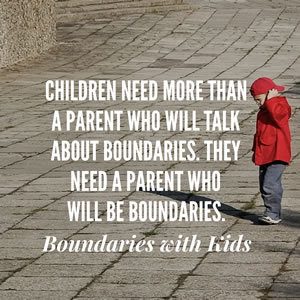 Children need more than a parent who will talk about boundaries. They need a parent who will be boundaries. This means that in whatever situation arises, you respond to your child with empathy, firmness, freedom, and consequences. This is how God handles his children, and he is our model. But, sometimes parents contribute to the problem by trying to justify their kid’s behavior, rather than addressing the issue.
Children need more than a parent who will talk about boundaries. They need a parent who will be boundaries. This means that in whatever situation arises, you respond to your child with empathy, firmness, freedom, and consequences. This is how God handles his children, and he is our model. But, sometimes parents contribute to the problem by trying to justify their kid’s behavior, rather than addressing the issue.
Setting boundaries with kids isn’t about “making” your child do anything. It is much more about structuring your child’s existence so that he experiences the consequences of his behavior, thus leading him to be more responsible and caring. Use the following three key steps to help begin the process with your kids:
Step 1: Acknowledge that your child is not perfect.
All kids are immature sinners; this is our human condition. Some parents have difficulty with this first step. They deny their child’s behavior. They rationalize genuine problems. For example, smarting off becomes a cute sense of humor. Laziness becomes fatigue. Intrusiveness becomes high-spiritedness.
Parents rationalize their child’s problems for many reasons. Some do it to avoid guilty feelings. Some don’t want their own perfectionism challenged. Some feel as if their child is being victimized. Others don’t want to be embarrassed. Still others don’t want to go through the effort of disciplining. Parents need to look at the possibility that they might be sacrificing their child’s well-being to protect their own sense of comfort and well-being. God never denied our craziness, and he went through the ultimate discomfort to solve the problem. Be a parent.
Step 2: Identify problems that aren’t really problems
After acknowledging that your child isn’t perfect, the next step is to identify that some of your child’s behavior problems aren’t really the problem. The action or attitude driving you crazy isn’t the real issue. It is the symptom of another issue, which in many cases is a boundary problem. Your child’s behavior may be driven by something broken or undeveloped within her character. The symptom alerts you to the inner problem.
Don’t just react to the symptom, or you will be guaranteeing more problems later. Parents often have a knee-jerk reaction in a crisis, then back off from their job when the crisis resolves. A boundaryless child will have symptoms until she develops boundaries. Here are some examples of problems that aren’t really the problem:
Outward Problem:
Boundary Problem:
Bad grades
Lack of concern about consequences
Controls other kids
Lack of respect for other’s boundaries
Doesn’t listen to instruction
Lack of fear of consequences
Defiant attitude
Lack of boundaries or entitlement
Step 3: Realize that time does not heal problems
The third step you will need to come to terms with is that time does not heal all. Many parents avoid addressing boundary problems because someone told them, “Just wait it out. They’ll get older.” Yes, your kids will get older. But, how many 42-year-olds do you know who are getting older but still have no boundaries? Time is only a context for healing. It is not the healing process itself. Infections need more than time; they need antibiotics.
In fact, avoiding dealing with problems in your child simply gives the Devil more opportunity to stunt his growth (see Ephesians 4:26-27). Time is a necessary but not sufficient condition for boundary growth and repair. You also need lots of love, grace, and truth for your child. Get involved in the repair process. With nothing but time, things do not improve, but break down further.
The words “parenting” and “problems” sometimes seem to be redundancies. You may simply be preventing problems in your child. Or you may have a troublesome situation that is breaking your heart. Yet, God has anticipated it, is fully aware of it, and wants to help you to help your child develop boundaries. He has provided hope for your and your child’s future that is real and helpful.
Don’t give up on your child, even as they enter adulthood. You are the only mom or dad they will ever have; no one in the world has the position of influence in their heart that you do.
________
 Get more proven advice to raise kids who take responsibility for their actions, attitudes, and emotions in Boundaries With Kids. Drs. Henry Cloud and John Townsend take you through the ins and outs of instilling the kind of character in your children that will help them lead balanced, productive, and fulfilling adult lives. Learn how to:
Get more proven advice to raise kids who take responsibility for their actions, attitudes, and emotions in Boundaries With Kids. Drs. Henry Cloud and John Townsend take you through the ins and outs of instilling the kind of character in your children that will help them lead balanced, productive, and fulfilling adult lives. Learn how to:
Set limits and still be a loving parent.
Bring control to a chaotic family life.
Define age-appropriate boundaries and consequences for your kids.
Click here to read a sample chapter, watch a teaching video, and purchase your copy.
The post Why Your Child Really Isn’t Perfect and What to Do About It appeared first on Boundaries Books.
November 15, 2016
How Intimacy Can Be Realized Through Conflict
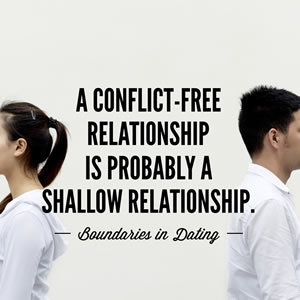 What is your normal reaction when conflict occurs in a new relationship? Are you comfortable addressing the issue? Or, do you stuff the issue out of fear or a desire preserve the peace? Honesty is the best policy for two important reasons:
What is your normal reaction when conflict occurs in a new relationship? Are you comfortable addressing the issue? Or, do you stuff the issue out of fear or a desire preserve the peace? Honesty is the best policy for two important reasons:
Being honest helps resolve the hurt or the conflict.
When you are honest, how the other person responds tells you whether a satisfactory relationship is possible.
If you are hurt in some way, bring it up. Don’t harbor bitter feelings. Or, if there is something that the other person has done that you do not like, or goes against your values, or is wrong, it must be discussed. If you don’t, then you are building a relationship based on a false sense of security and closeness. And it is possible that your feelings will be confused by hurt and fear. A lot is lost in not finding out who the other person is and where the relationship could really go, if one or both people are not facing hurt and conflict directly. In reality, a conflict-free relationship is probably a shallow relationship.
Second, you need to find out if the person you are with is capable of dealing with conflict and hurt directly. The Bible and all relationship research is very clear on this issue: people who can handle confrontation and feedback are the ones who can make relationships work. You must find out, sooner rather than later, if the person you are with is someone you can talk to. If you get serious with someone who cannot take feedback about hurt or conflict, then you are headed for a lifetime of aloneness, resentment, and perhaps even abuse.
Proverbs puts it well about a person who cannot take confrontation: “Do not rebuke a mocker or he will hate you; rebuke a wise man and he will love you” (Proverbs 9:8). “A mocker resents correction; he will not consult the wise” (Proverbs 15:12).
Whether you’re dating someone, starting a new friendship, or building a business alliance, you need to know if you are in a relationship with someone who is going to be defensive when you bring up hurt or conflict, or if you are with someone who is going to be able to listen, learn, and respond. If you do not deal with conflict early on, and the relationship gets serious, then you have bought yourself a world of trouble.
Honesty over hurt and conflict creates intimacy, and it also divides people into the wise and the foolish. But being honest is totally up to you. You cannot control what the other person does. However, you can decide what kind of person you are going to be. As a result, you will also be deciding what kind of person you are going to be with.
________
Taken from Boundaries in Dating: How Healthy Choices Grow Healthy Relationships by Dr. Henry Cloud and Dr. John Townsend. Click here to learn more about this helpful book and read a sample chapter.
The post How Intimacy Can Be Realized Through Conflict appeared first on Boundaries Books.
November 3, 2016
Are You Carrying Someone Else’s Knapsack?
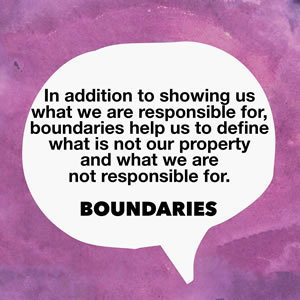 We are responsible to others and for ourselves. “Carry each other’s burdens,” says Galatians 6:2, “and in this way you will fulfill the law of Christ.” This verse shows our responsibility to one another.
We are responsible to others and for ourselves. “Carry each other’s burdens,” says Galatians 6:2, “and in this way you will fulfill the law of Christ.” This verse shows our responsibility to one another.
Many times, others have “burdens” that are too big to bear. They do not have enough strength, resources, or knowledge to carry the load, and they need help. Denying ourselves to do for others what they cannot do for themselves is showing the sacrificial love of Christ. This is what Christ did for us. He did what we could not do for ourselves; he saved us. This is being responsible “to.”
On the other hand, Galatians 6:5 says that “each one should carry his own load.” Everyone has responsibilities that only he or she can carry. These things are our own particular “load” that we need to take daily responsibility for and work out. No one can do certain things for us. We have to take ownership of certain aspects of life that are our own “load.”
The Greek words for burden and load give us insight into the meaning of these texts. The Greek word for burden means “excess burdens,” or burdens that are so heavy that they weigh us down. These burdens are like boulders. They can crush us. We shouldn’t be expected to carry a boulder by ourselves! It would break our backs. We need help with the boulders — those times of crisis and tragedy in our lives.
In contrast, the Greek word for load means “cargo,” or “the burden of daily toil.” This word describes the everyday things we all need to do. These loads are like knapsacks. Knapsacks are possible to carry. We are expected to carry our own. We are expected to deal with our own feelings, attitudes, and behaviors, as well as the responsibilities God has given to each one of us, even though it takes effort.
Problems arise when people act as if their “boulders” are daily loads, and refuse help, or as if their “daily loads” are boulders they shouldn’t have to carry. The results of these two instances are either perpetual pain or irresponsibility.
Lest we stay in pain or become irresponsible, it is very important to determine what “me” is, where my boundary of responsibility is and where someone else’s begins. The Bible tells us clearly what our parameters are and how to protect them, but often our family, or other past relationships, confuses us about our parameters.
In addition to showing us what we are responsible for, boundaries help us to define what is not on our property and what we are not responsible for. We are not, for example, responsible for other people. Nowhere are we commanded to have “other-control,” although we spend a lot of time and energy trying to get it!
________
 Learn the difference between burdens and boulders in The New York Times bestseller, Boundaries. You can set limits with other people and still be a loving person. Discover when to say yes and how to say no in any situation. Learn More
Learn the difference between burdens and boulders in The New York Times bestseller, Boundaries. You can set limits with other people and still be a loving person. Discover when to say yes and how to say no in any situation. Learn More
The post Are You Carrying Someone Else’s Knapsack? appeared first on Boundaries Books.
October 31, 2016
How to Guarantee that People Will Want to Be Close to You
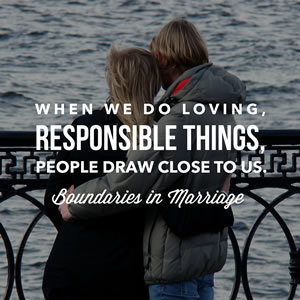 Amy and Randall had been married for eight years, and they loved each other. However, when he was angry or upset, Randall became moody and would withdraw from Amy and the kids, except for occasional outbursts of anger. When his manufacturing business was struggling, he would sit silently through dinner. Once, during this period, the children were arguing at the dinner table. Out of the blue, Randall said, “Amy, can’t you keep these children in line? I can’t even have a moment’s peace in my own home!” And with that, he stormed out of the kitchen into his home office, turned on the computer, and stayed there until the kids went to bed.
Amy and Randall had been married for eight years, and they loved each other. However, when he was angry or upset, Randall became moody and would withdraw from Amy and the kids, except for occasional outbursts of anger. When his manufacturing business was struggling, he would sit silently through dinner. Once, during this period, the children were arguing at the dinner table. Out of the blue, Randall said, “Amy, can’t you keep these children in line? I can’t even have a moment’s peace in my own home!” And with that, he stormed out of the kitchen into his home office, turned on the computer, and stayed there until the kids went to bed.
Amy was hurt and confused. But she had a pattern of “handling” Randall’s moods. She would try to cheer him up by being positive, encouraging, and compliant. “He has a hard job,” Amy would think. “Nurturance is what he needs.” And for the next few hours, and sometimes days, she would center the family’s existence around Dad’s mood. Everyone would walk on eggshells around him. No one was to complain or be negative about any subject, for fear of setting him off again. And Amy would constantly try to draw him out, affirm him, and make him happy. All her emotional energy went into helping Randall feel better.
Amy and Randall’s struggle illustrates the importance of the first law of boundaries: “The Law of Sowing and Reaping.” Simply put, this principle means that our actions have consequences. When we do loving, responsible things, people draw close to us. When we are unloving or irresponsible, people withdraw from us by emotionally shutting down, or avoiding us, or eventually leaving the relationship.
In their marriage, Randall was sowing anger, selfishness, and withdrawal of love. These hurt Amy’s feelings and disrupted the family. Yet Randall was not paying any consequences for what he was sowing. He could have his tantrum, get over it, and go about his business as if nothing had happened. Amy, however, had a problem. She was bearing the entire burden of his moodiness. She stopped what she was doing to take on the project of changing her moody husband into a happy man. Randall was “playing,” and Amy was “paying.” And because of this, he was not changing his ways. Randall had no incentive to change, as Amy, not he, was dealing with his problem.
What consequence should Randall have been experiencing? Amy could have said to him, “Honey, I know you’re under stress, and I want to support any way I can. But your withdrawal and rage hurt me and the children. They are unacceptable. I want you to talk more respectfully to us when you’re in a bad mood. The next time you yell at us like that, we’ll need some emotional distance from you for a while. We may leave the house and go to a movie or see some friends.” Then Randall would have to deal with the result of his actions: loneliness and isolation.
When you sow mistreatment of people, you should reap people’s not wanting to be around you. It is to be hoped that the pain of this loneliness would help Randall take steps to deal with his feelings. Sowing and reaping has to do with how spouses affect and impact each other’s heart. Amy and Randall had a problem in relational sowing and reaping. He was being hurtful and difficult, yet Amy took the consequences of his behavior for him.
In their relationship, the one who has the problem isn’t facing the effects of the problem. And things don’t change in a marriage until the spouse who is taking responsibility for a problem that is not hers decides to say or do something about it. This can range from mentioning how her spouse’s behavior hurts her feelings, all the way to setting a limit on the behavior. This helps place both the sowing and the reaping with the same person and begins to solve the boundary violation.
________
 Whether you’re a newlywed or married for many years, learn how Boundaries in Marriage will help you build a foundation for your relationship to flourish. Learn More
Whether you’re a newlywed or married for many years, learn how Boundaries in Marriage will help you build a foundation for your relationship to flourish. Learn More
The post How to Guarantee that People Will Want to Be Close to You appeared first on Boundaries Books.
October 26, 2016
The Best Boundary that You Can Have in Your Dating Life
 Romance is great. Sexuality is great. Attraction is great. But here is the key: If all of those are not built upon lasting friendship and respect for the person’s character, something is wrong.
Romance is great. Sexuality is great. Attraction is great. But here is the key: If all of those are not built upon lasting friendship and respect for the person’s character, something is wrong.
A real and lasting relationship must be built upon friendship first. You are going to spend a lot of time with that person. As one friend of mine said about picking her mate: “He was someone I knew I could grow old with. I liked spending time with him. And he made me laugh.” She also shared deep spiritual values and other commonalties with him as well, as she would with any other friend. They have been married for nearly thirty years.
The best boundary that you can have in your dating life is to begin every relationship with an eye toward friendship. Do not rush into any kind of romance. Keep your boundaries, physically, emotionally, and otherwise. But, how do you do this?
Spend time getting to know someone in nonromantic ways. For example:
Spend time with that person in groups of other friends.
How well does he or she fit in? How well do you fit in with his or her friends?
Does he or she even have friends?
(If they do not have long-term friendships, that is a bad sign.)
If you do not allow yourself to rush into falling for someone that you have not become friends with first, you will be more sure when you let yourself go to the next step. Certainly you might find yourself having all sorts of feelings. Enjoy them. But do not believe them. Only believe your experience of getting to know a person and seeing if you can share at a deep level.
See if you find that he or she is a person of the kind of character you would trust as a friend. And as important as all of that, see if that person is a person that you would like spending time with if there were no romance at all. That is the one true measure of a friend, a person with whom you like to spend time, having no regard to how you are spending it. “Hanging out” is fulfilling in and of itself. And that, long-term, requires character, and in the deepest of friendships, shared values as well. You would want your best friends to be honest, faithful, deep, spiritual, responsible, connecting, growing, loving, and the like. Make sure that those qualities are also present in the person you are falling in love with.
Keep your boundaries. We guarantee that being lovers with someone you would not want to be friends with is no good thing at all.
________
 Get more helpful advice to build the best dating relationship and find the love of your life in Boundaries in Dating by Dr. John Townsend and Dr. Henry Cloud.
Get more helpful advice to build the best dating relationship and find the love of your life in Boundaries in Dating by Dr. John Townsend and Dr. Henry Cloud.
The post The Best Boundary that You Can Have in Your Dating Life appeared first on Boundaries Books.
The Best Boundary That You Can Have in Your Dating Life
 Romance is great. Sexuality is great. Attraction is great. But here is the key: If all of those are not built upon lasting friendship and respect for the person’s character, something is wrong.
Romance is great. Sexuality is great. Attraction is great. But here is the key: If all of those are not built upon lasting friendship and respect for the person’s character, something is wrong.
A real and lasting relationship must be built upon friendship first. You are going to spend a lot of time with that person. As one friend of mine said about picking her mate: “He was someone I knew I could grow old with. I liked spending time with him. And he made me laugh.” She also shared deep spiritual values and other commonalties with him as well, as she would with any other friend. They have been married for nearly thirty years.
The best boundary that you can have in your dating life is to begin every relationship with an eye toward friendship. Do not rush into any kind of romance. Keep your boundaries, physically, emotionally, and otherwise. But, how do you do this?
Spend time getting to know someone in nonromantic ways. For example:
Spend time with that person in groups of other friends.
How well does he or she fit in? How well do you fit in with his or her friends?
Does he or she even have friends?
(If they do not have long-term friendships, that is a bad sign.)
If you do not allow yourself to rush into falling for someone that you have not become friends with first, you will be more sure when you let yourself go to the next step. Certainly you might find yourself having all sorts of feelings. Enjoy them. But do not believe them. Only believe your experience of getting to know a person and seeing if you can share at a deep level.
See if you find that he or she is a person of the kind of character you would trust as a friend. And as important as all of that, see if that person is a person that you would like spending time with if there were no romance at all. That is the one true measure of a friend, a person with whom you like to spend time, having no regard to how you are spending it. “Hanging out” is fulfilling in and of itself. And that, long-term, requires character, and in the deepest of friendships, shared values as well. You would want your best friends to be honest, faithful, deep, spiritual, responsible, connecting, growing, loving, and the like. Make sure that those qualities are also present in the person you are falling in love with.
Keep your boundaries. We guarantee that being lovers with someone you would not want to be friends with is no good thing at all.
________
 Get more helpful advice to build the best dating relationship and find the love of your life in Boundaries in Dating by Dr. John Townsend and Dr. Henry Cloud.
Get more helpful advice to build the best dating relationship and find the love of your life in Boundaries in Dating by Dr. John Townsend and Dr. Henry Cloud.
The post The Best Boundary That You Can Have in Your Dating Life appeared first on Boundaries Books.
October 18, 2016
Do Not Obey Your Parents — Boundaries with Mom & Dad
 As an adult, loving and honoring your parents does not equal obeying. God placed you with your parents for a season of time to help you grow into a mature adult. At some point this season ends, and your relationship with your mom and dad changes from child-to-parent to adult-to-adult. The roles change from dependency and authority to mutuality. While you are to respect and care for your parents, you are no longer under their protection and tutelage. Children are to obey parents, while adult children are to love and honor them. Therefore, sometimes you will need to confront parents, disobeying their desire for you to agree with them or go along with a bad situation.
As an adult, loving and honoring your parents does not equal obeying. God placed you with your parents for a season of time to help you grow into a mature adult. At some point this season ends, and your relationship with your mom and dad changes from child-to-parent to adult-to-adult. The roles change from dependency and authority to mutuality. While you are to respect and care for your parents, you are no longer under their protection and tutelage. Children are to obey parents, while adult children are to love and honor them. Therefore, sometimes you will need to confront parents, disobeying their desire for you to agree with them or go along with a bad situation.
People often have difficulty confronting parents, because they still feel like a little child with them. Emotionally they have not left home, so they do not feel free to be separate, truthful, and honest with them. There is too much to lose. If this sounds like you, it might be very helpful to work on these issues in a small-group setting or with a counselor in order to free yourself up from the past so that you can be an adult in the present.
One concrete example of moving out of obedience and dependence on parents happens when you decide that you will not spend some traditional holiday time with your parents. This can often be a cause for a confrontational talk:
You: “Mom, I wanted to let you know as soon as I could that I’ve made plans to go to the mountains with some friends this Christmas. I know this will be the first Christmas I won’t be with you and Dad, so I wanted to talk to you about it.”
Mom: “What are you talking about? You always spend Christmas with us. Your father will be so hurt.”
You: “I’m so sorry you feel that way. I would never want to hurt you. But this year I have a really good group of friends from my singles group at church that I want to spend the holidays with. It’s not about not caring about you; it’s about wanting to be involved with these people at a deeper level.”
Mom: “Can’t you do that at another time? I mean, it will ruin our holiday.”
You: I hope it doesn’t ruin things for you. That’s why I’m telling you this several months in advance, so you can make sure you have time to make any other arrangements you need to so your holiday will be good.
Mom: “Don’t you care about how we feel?”
You: “Yes, Mom, I care very much. And I do like spending time with you. If you think that I don’t care, then maybe we can talk at some other point about your feelings, because I would like to reassure you that I care. But the point of this phone call was simply to give you a heads up so that we can plan and adjust for this change.”
In addition, don’t forget that your parent may need for you to be a change agent in her life. You may be one of the few people in her circle who is aware of her hurtful behavior or attitude. So, just as her job was to correct you in years past, your job (without the parental authority role) may be to correct her in the present. I know of many situations in which an adult child’s confrontation of a parent was life changing for both.
________
 The award-winning book, Boundaries, includes specific chapters dedicated to helping you solve problems with your family, children, spouse, friends, and co-workers. Learn how to set effective limits and still be a loving person. Boundaries make life better! Learn More
The award-winning book, Boundaries, includes specific chapters dedicated to helping you solve problems with your family, children, spouse, friends, and co-workers. Learn how to set effective limits and still be a loving person. Boundaries make life better! Learn More
The post Do Not Obey Your Parents — Boundaries with Mom & Dad appeared first on Boundaries Books.
October 9, 2016
How to Determine the Right Consequences When Setting Boundaries
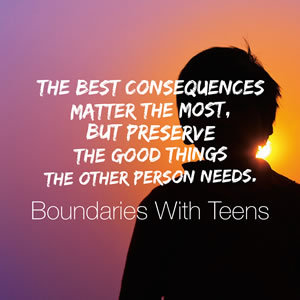 Not long ago I (Dr. Townsend) took my kids and some of their friends to a major league baseball game for an outing. While we were watching the game, a young boy sitting behind us was making everyone miserable. He was out of control, loud, and rude.
Not long ago I (Dr. Townsend) took my kids and some of their friends to a major league baseball game for an outing. While we were watching the game, a young boy sitting behind us was making everyone miserable. He was out of control, loud, and rude.
His parents did try to manage him, but their efforts were ineffective. They shushed him, praised him when he was quiet, bribed him with food, and threatened to take him out of the game. Nothing worked.
Finally, one of my son’s friends turned to me and said, “That guy needs some serious consequences.” I made a note to myself to call his parents when I got home and congratulate them. I don’t often hear that kind of thing from adolescents.
If you are like many of the people I talk with, you may often have difficulty identifying and following through with appropriate consequences. Let’s take a look at a five simple principles that can guide you in determining the right consequences when setting boundaries.
1. Remove the Desirable, Add the Undesirable
A consequence is either removing the desirable or adding the undesirable to someone else’s life as the result of a rule violation. If you have a teenager, examples might include the removal of television privileges or the addition of extra chores.
In my experience, removing something other people want is usually more effective than adding something they don’t want. This is true for two reasons. First, many people today have a lot of extracurricular demands (sports, music, theater, church, and so on), so they have less free time to do whatever has been added to their already busy schedule.
Second, it requires more of your time and energy to supervise and monitor added responsibilities than it does to remove an activity. So, before you impose a consequence that involves adding something, make sure it is worth your personal investment.
2. Don’t Interfere with a Natural Consequence
Whenever possible, allow other people to face a natural consequence to an undesirable behavior or attitude. Don’t intervene. For example, allow the other person to:
Lose a relationship as a result of being selfish
Spend the night at the police station after being picked up for loitering late at night
Miss out on going to a movie, concert, or event as a result of having spent all their money
These types of consequences are powerful and effective. Even better, all they require from you is that you get out of the way! Of course, many situations do not have a natural consequence, and in those instances, you need to apply something of your own making.
3. Make the Consequence Something That Matters
A consequence must matter to the other person. He or she must be emotionally invested in it. She needs to want and desire what she is losing; she needs to not like what she is having to add. Otherwise, the experience doesn’t count for much. For instance, if you have a loner kid who loves her music, she likely won’t mind being restricted to her room with her stereo. That is why you need to know your own teen’s heart, interests, and desires.
This might lead some people to ask: What if nothing matters? You might be a parent who has tried everything, but your teen doesn’t really seem to care. Keep in mind that your teen may be engaging in a power play with you, holding out to see how far you will take this. If so, the consequences do matter to your teen, but she doesn’t want you to know, either because she’s so angry at you that she wants you to feel helpless. Or, she is waiting you out in hopes that you will drop the consequence. In these situations, you may need to talk with your teen about her anger and try to connect and defuse things while also keeping the limit going. In time, your teen will likely become aware that she is only hurting herself, and will begin to respond.
When you do see a positive response, be sure you are warm and encouraging with your comments. When people submit to a consequence, they often feel humiliated, weak, powerless, and alone, which puts them in a very vulnerable position. They need grace and comfort. So refrain from lecturing, making jokes, or showing that you were right. Treat others as you’d like to be treated in a similar situation.
4. Give the Most Lenient Consequence that Works
How severe is too severe? How easy is too easy? You’ll want to ensure that the consequences fit the violation appropriately. The time should fit the crime. When consequences are too strict, it can lead to alienation, discouragement, or increased rebellion. When they are too lenient, it can lead to increased disrespect and a lack of the desired change in the other person.
So, give the most lenient consequence that works. Keep your mind on the goal, which is a heightened sense of responsibility, accountability, and self-awareness. If a more lenient consequence changes behavior, and the change lasts over time, then you are on the right track. If it does not, and you are providing the right amounts of love, truth, and freedom, then you may want to increase the heat of the consequence over time until you see change.
5. Preserve the Good
Here’s another good rule of thumb: the best consequences matter the most, but preserve good things the other person needs. Impose consequences that are a big deal, but don’t remove activities that are good, such as participating in sports, taking music or art lessons, going to church, etc. These activities teach important lessons in discipline, cooperation, skill building, and coaching, and in so doing contribute to your child’s development or the other person’s growth.
________
 Is setting boundaries and determining consequences with your teenage son or daughter driving you crazy? Dr. John Townsend provides the expert insight you need to help your teens take responsibility for their actions, attitudes, and emotions while gaining a deeper appreciation and respect both for you and for themselves. With wisdom and empathy, Dr. Townsend, a father of two teens himself, applies biblically-based principles for the challenging task of leading your children through the teen years. With his guidance, you will be able to:
Is setting boundaries and determining consequences with your teenage son or daughter driving you crazy? Dr. John Townsend provides the expert insight you need to help your teens take responsibility for their actions, attitudes, and emotions while gaining a deeper appreciation and respect both for you and for themselves. With wisdom and empathy, Dr. Townsend, a father of two teens himself, applies biblically-based principles for the challenging task of leading your children through the teen years. With his guidance, you will be able to:
Deal with disrespectful attitudes and impossible behavior in your teen.
Set healthy limits and realistic consequences.
Be loving and caring while establishing rules.
Determine specific strategies to deal with problems both big and small.
Click here to read a sample chapter and purchase today
The post How to Determine the Right Consequences When Setting Boundaries appeared first on Boundaries Books.
September 23, 2016
How to Regain Positive Momentum in the Midst of Negative Circumstances
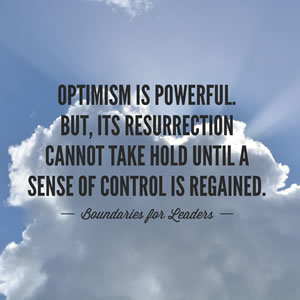 I (Dr. Cloud) was addressing an organization in the aftermath of a financial meltdown. We discussed why so many people were feeling down, defeated, and unable to perform at the levels they were used to. (It is amazing how just knowing that there is a reason for why you feel the way you do can be helpful. I wanted them to know that they weren’t crazy.) But then, I heard the words that I never want to hear…
I (Dr. Cloud) was addressing an organization in the aftermath of a financial meltdown. We discussed why so many people were feeling down, defeated, and unable to perform at the levels they were used to. (It is amazing how just knowing that there is a reason for why you feel the way you do can be helpful. I wanted them to know that they weren’t crazy.) But then, I heard the words that I never want to hear…
“So, what you are telling us is that we are basically screwed,” an attendee said. “We are just going to feel this way until the economy is different. This is just the new normal.”
“Yes, you are right,” I said. “This has become the new normal. And that is exactly your problem.”
“What do you mean?” she asked.
“Your creative drives, the energy that you summon to go out and win, have shut down,” I said. “You feel that since you can’t control the economy, you can’t control anything. And now that you have been feeling that way for a while, your brain has tricked you into thinking that that is the way it really is, that there is nothing you can do about it. And it has become, as you say, ‘normal’ to think that way.”
I went on to explain that the thing she was calling the “new normal” was a state inside her head. “It has become normal to you to feel that there is nothing you can do.”
“That is how I feel,” she said. “I just find myself not knowing what to do.”
“Exactly,” I said. “But if anyone knows what to do, it is probably you. You have been a leader at this company, and in this industry, for over a decade and a very high performer. If you can’t figure out something to do, who can?”
What I am about to tell you is going to sound so simplistic that you might miss the profound value that it has. But you have to just trust me that its effects can be incredible for your life.
First, take a piece of paper and draw a line down the middle of the page, creating two columns. In column number one, write down all of the things that you have no control over that are making your business difficult, such as the economy, the stock market, your customers’ finances, the banks, your boss, the parent company, the health care cost increase, the company’s overall budget, the board, the elections, the newscasts that hurt your business, etc. Those are the things that you have no control over that truly are affecting you. Get everything in that column that you can think of.
Next, I want you to really worry about these items, even as a group. Obsess over them. Ruminate. Dwell. Think it through over and over…FOR ABOUT FIVE OR TEN MINUTES. Then, I want you to set the list aside until the next day when you can do the same thing all over again. The reason I suggest that you do this is that you need to! You need to worry about this stuff, and get into “Ain’t it awful!” for a few minutes because it is! It is really bad stuff. I do not want you to be in denial. Besides, your brain needs to complete the loop of making sure that you know how bad it is. Otherwise, it will continue to remind you of it, probably in the middle of the night or every time you have some good idea. So, focus on it. But…only for about five or ten minutes.
Next, after you have had your “worry time,” I want you to draw a circle around that time block and stop thinking about that column. Quarantine it. Put a boundary around it. If you find it helpful, put a red STOP sign on it. No more thinking about those things.
Next, and most important, let’s go to the second column. In this column, I want you to write down everything that you DO have control over that can drive results. This need not be a final list. You can always add more activities as they occur to you and your team, as they probably will change as time goes on. But once you have the list in the initial form, I want you to focus on it every single day. Make prioritizing and doing those activities the primary focus of every day. Work the list.
What makes this simple exercise so powerful is that it speaks directly to our brains’ executive functions and our desire to have control. The brain begins to “attend” to the actual activities that it can control, and it “inhibits” the thoughts, behaviors, and information that interfere with positive actions. The process of doing this, individually and collectively, builds up working memory and creates those positive, action-oriented behaviors that lead to better results, new products, new partnerships, new customers, and a lot more fun. The brain begins to get out of the mud.
Optimism is powerful. But, its resurrection cannot take hold until a sense of control is regained.
________
Is negative thinking overwhelming your ability to get results in your personal life, your organization, or your workplace? Discover why some people get results and others don’t in Boundaries for Leaders by Dr. Henry Cloud.
The post How to Regain Positive Momentum in the Midst of Negative Circumstances appeared first on Boundaries Books.
September 19, 2016
How to Overcome a Victim Mentality
 A woman complained to me (Dr. Cloud) about a coworker who would always interrupt her while she was trying to get her job done. She acted as if her tendency to be behind in her work was her coworker’s fault.
A woman complained to me (Dr. Cloud) about a coworker who would always interrupt her while she was trying to get her job done. She acted as if her tendency to be behind in her work was her coworker’s fault.
“Why do you talk to her?” I asked.
“What do you mean?” she replied.
“When she comes in and interrupts, why do you get into a conversation with her?”
“Well, I have to. She is standing there talking.”
“Why don’t you just tell her that you have work to do, or close your door and put up a ‘Do Not Disturb’ sign?”
The woman looked at me with a blank stare. To have choices and to have control of her own behavior was a concept that hadn’t occurred to her. She felt that if something happened “to her,” then that was the way it had to be. There was nothing she could do to change it.
When I suggested that she had many choices, she quizzed me about them. I gave her five or six suggestions, from talking to the woman about the problem, to talking to a supervisor, to asking to be moved to another area. This was a totally new way of thinking for her; she had never learned that she was free to make choices in relationships and in life.
Have you ever been in a relationship with a “victim”? Victims feel as if they have no choices in life. Life is something that happens to them, and whatever comes their way is their lot.
Joe was such a victim. His company was imposing some new policies that he found difficult to handle, and he was very depressed about the changes.
“What are you going to do about it?” I asked him.
“What do you mean, do about it?” Joe asked.
“I mean what are you going to do about your being stuck in something you don’t like?”
He just looked at me. It took a long time before he realized that he could choose to get his resume out to some other firms and not be a victim to the fifty-hour workweek he hated.
Adults and children raised with good boundaries learn that they are not only responsible for their lives, but also free to live their lives any way they choose, as long as they take responsibility for their choices. For the responsible adult, the sky is the limit.
We live in a society of people-pleasers and victims. People today act as if they have no choices in life and that everything should be done for them. If it’s not, they can’t do it themselves or make changes. This presents a big opportunity for the future: If you learn to take control of your own life, you will be so far ahead of everyone else that success in life is all but guaranteed!
________
From Boundaries with Kids by Dr Henry Cloud and Dr. John Townsend. Learn more about this amazingly helpful resource.
The post How to Overcome a Victim Mentality appeared first on Boundaries Books.



